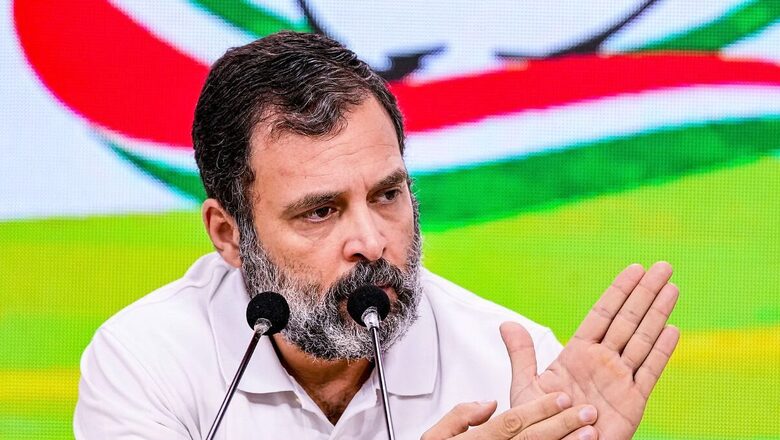
views
Rahul Gandhi’s media conference on Saturday where he attacked a journalist for merely asking a routine question, is a new low even for his bottom-scraping standards. Apart from exposing his mentality, that of a school bully and a petulant child, the 52-year-old proved one more time why he is a failed politician and why no amount of packaging, repackaging, campaigning, relaunching and window-dressing will ever change the reality.
The news conference, his first since getting disqualified as an MP, was a disaster. It could have been so very different. The situation that led to the presser was unusual. After a long time, it felt as if Congress has a strong political case to make. Regardless of the merit of the sentencing and the disqualification that followed, which is outside the purview of this piece, even a mediocre politician would have been able to create some tailwind.
There could be a legitimate debate about the need for continuing with the archaic defamation laws. The disqualification, however, has followed the legal rulebook, and Gandhi isn’t the first politician to fall foul of the law. But he’s certainly the most high profile one. It threw light on the 2013 verdict of the Supreme Court in the ‘Lily Thomas Vs Union Of India’ case where it was ruled that a lawmaker would be disqualified immediately, without any window of appeal, if sentenced to two or more years of imprisonment.
Still, it seemed disproportionate that a politician is sentenced to two years of jail for ‘defamation’ and disqualified as a lawmaker for rhetorical excesses during a speech, a culture quite common in the cut and thrust of Indian politics.
The BJP and the Narendra Modi government may have nothing to do with the judicial process, but in popular perception — one that Congress certainly hopes to fuel and capitalise on — Rahul’s debarment appears as if BJP is not just going after Gandhi but launching a nuclear device to target a man brandishing a wobbly stick. A skilled politician would have exploited the framing, spinning a narrative of persecution by the state and ‘sacrifice’ for the nation. Critics of the BJP ‘welcomed’ the development, hoping it would damage BJP’s credibility.
The stage was set. All that Gandhi needed to do at the news conference was stay true to the script that his speechwriters and managers would have handed out to him, and launch the narrative that even the BJP expected of him.
But this is Rahul Gandhi, the scion of India’s political royalty whose imperial ways cannot be fathomed by mere mortals. Wearing his signature ‘hurt look’ and a snugly fitted white polo that compliments his biceps, Gandhi swaggered into the presser and let it rip.
In his own eyes, he was single-handedly slaying the media, that he considers an ally of the BJP, with ‘truth bombs’ and ‘fearlessness’, even though the world was witnessing a petulant and immature politician — who never tires of claiming that his politics is all about “love”, “listening” and “compassion” — channeling his inner frustration and bitterness in full public glare.
On BJP’s demand that Gandhi must apologise for “insulting the nation on foreign soil”, Gandhi came out with his favourite line: “My name is not Savarkar, I am Gandhi. I won’t apologise.” It is difficult to imagine a dafter statement reeking of recklessness and terrible political judgment.
Rahul’s statement gave Maharashtra chief minister Eknath Shinde the opportunity to launch ‘Savarkar Gaurav Yatra’ and put Congress ally, the Uddhav Thackeray faction of Shiv Sena, in such a deep state of bother, that Thackeray was left with a trapeze-artist act to maintain the alliance yet shake off the slur against Savarkar, one of India’s greatest icons who is especially deeply revered in Maharashtra. It was difficult to understand what Gandhi was trying to achieve through the Savarkar slur.
Yet if that revealed a lack of political acumen, no one was prepared for the explosion ahead. To a routine question by a senior beat journalist — incidentally one who has covered the Congress party for a long time — on what he thinks of BJP’s charge that Gandhi had insulted the ‘Modi community’, Gandhi exploded into a frightful rage.
He launched a fierce attack against the journalist and accused him of working for the BJP. After heaping insults on the shocked and bemused gentleman, Gandhi rounded it off with a street cant, “Kyun hawa nikal gayi?”, a mocking half-smile dangling at the corner of his lips, reflecting absolute, hostile derision for the media person who had the temerity to ask him a question that he deemed offensive.
Gandhi wasn’t dropping a ‘truth bomb’, he was name-calling and ridiculing a journalist who was trying to do his job. It reflected a breathtaking sense of entitlement. Gandhi behaved as if he was the feudal lord, rebuking a subject for falling out of line in his durbar where he expects nothing but homage and fealty from toadying hacks.
If this the kind of bullying attitude Gandhi shows on camera in a presser, one may only imagine the kind of arrogance and boorishness he carries off camera. Yet Gandhi’s inglorious hour was a true reflection of the man that he really is. The rebel in him sometimes seeks to break free from the simulated image of a hard-headed democrat that the party wants him to adopt. Sometimes the pretense is too heavy a cross to bear.
It must be tough for the Congress First Family to adjust to the new uncomfortable reality where journalists are not fawning courtiers of their imperial dynasty. This is a new India.
The views are personal and do not express the stand of this publication.
Read all the Latest Opinions here


















Comments
0 comment